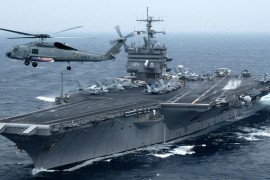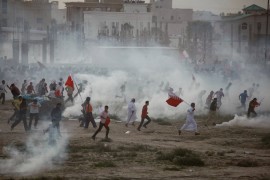Bahraini women wave the Bahraini flag and shout anti-government slogans during a rally held by the Wefaq opposition party, in the village of Boori, south of Manama, 14 October 2011, to mark the 8-month anniversary of the February 14 uprising. (Photo: REUTERS – Hamad I Mohammed)
By: Abbas Bu-Safwan
Published Friday, October 21, 2011
The Bahraini popular uprising is bound by its local framework and by regional and international factors that guide its direction and may define its outcome. In light of this reality, a more comprehensive approach needs to be taken towards the choices and outcomes that await the current political situation in Bahrain.
The uprising in Bahrain is purely an internal event. It is the manifestation of people’s bitterness toward the ruling dynasty and their monopolization of power. The uprising is merely the translation or embodiment of people’s resentment stemming from a dictatorial regime and from corruption, including the inconsistent implementation of law and the strong hold that security forces have over politics. The regime in Bahrain has demonstrated an increasingly entrenched discrimination against its Shiite citizens. The government has taken steps to change the demographics by illegally offering Bahraini nationality to non-Shiite migrants, though Shia still represent at least two-thirds of the population in the country. This internal tension is at least a century old, and its renewal reflects the depth and longevity of the crisis. Since the 1930s, Bahrainis have demanded an elected parliament and a regime that upholds the law equally for all its citizens.
The geopolitical realities of the small islands of Bahrain may prevent a democracy from ever taking hold. At the very least, the characteristics of the Bahraini ruling system and its rentier economy impede any transition to a democratic regime. The geographic location of Bahrain is a factor that also hinders renovation of the country’s tribal structure. How so?
Bahrain is in the center of a turbulent region, with a history of wars that precedes the establishment of the relatively new state. This region that includes Saudi Arabia and the Gulf countries is governed by tribes. Bahrain’s Al Khalifa tribe has controlled political power and the national wealth for the past 230 years. Such regimes don’t tolerate authentic democratic transformations that allow people to effectively participate in the ruling of their country. Moreover, Saudi Arabia considers Bahrain to be its backyard. In other words, it has a real say in Bahraini affairs. When demonstrations spread in Manama between mid-February and March, Saudi Arabia felt that its influence in Bahrain was threatened. It intervened militarily in a crude and unprecedented manner.
The Saudi obstinacy in Bahrain is due to Saudi Arabia’s diminishing influence in other areas. The fact that the Eastern province of Saudi Arabia has a majority of Shiites increases regional and western reservation about the democratic transformation in Manama. This transformation will automatically result in increasing Shiite influence in Bahrain due to their demographic majority.
Some Bahraini activists have long aspired for their Saudi brethren in the Eastern province of Saudi Arabia to join their activism. The mere thought of that reality has Saudi Arabia keen on obliterating the Bahraini peaceful movement, as it poses a threat to the Saudi ruling system. Iraq’s close location to Bahrain has contributed to international reluctance in accepting a democratic transformation in Bahrain, for post-Saddam Iraq is now widely viewed as Shiite Iraq. On the other hand, some advocates of change in Bahrain see that Iraq could have a positive role in the logistical support of the Bahraini uprising. In other words, having Iraq on its side would be a real advantage to the Bahraini democracy movement; for despite the ongoing troubles in Iraq, one can’t deny the country’s human, political, and historic capital.
If this scenario is realized, geopolitics would be in favor of the uprising movement in Manama. But the fact remains that Iraq’s ‘Shiiteness’ raises regional and western concern about the increasing Shiite aspirations in the region.
As for the ever-growing Iranian influence, both regionally and in the Middle East, it creates further concern about a democracy in Bahrain. Shiites will then gain real power, and Iran is verily endorsing the Bahraini movement for democracy.
It is increasingly apparent that the differing views of Iran and Iraq on the one hand, and Saudi Arabia and the Gulf countries on the other, has allowed the US to impose itself in the middle of this heated situation and assume a central role in the Bahraini ordeal. With the US Navy’s 5th fleet headquarters situated in Bahrain, a third player is now heavily involved in the game.
What is remarkable is that US experts consider Bahrain to be more strategically important than Cairo. Bahrain is situated between the Gulf countries, which are rich with oil wells, on one hand and Iran, the United States’ archenemy, on the other. The White House’s stand vis à vis the Bahraini uprising is drawn while keeping in mind that Saudi Arabia and Iran are not mere spectators in the Bahraini situation. This explains why the US is supportive of the current ruling system in Bahrain. The ruling families of the Gulf and dictatorial regimes will reap this victory, while Arab Spring and the people have received a capital sentence. US support is also a Saudi victory against Iran.
President Obama is fully aware that explicit support for the legitimate demands of the Bahraini people would be considered in the US to show clear support of Iranian influence in Bahrain. The prevailing culture in the US links Shiite Iran with Bahrain’s Shiite majority.
Geopolitics seems to be one of the main challenges that the Bahraini popular movement faces. And it might just be the biggest hurdle that stands between the people and the realization of their desire to have a truly democratic regime in Bahrain. What does this impose on the Bahraini people?
The people of Bahrain need to understand the complexity of geopolitics. They need to provide the Gulf countries, the US, Britain and the world with assurances about the reality of their political stands. They must reassure the Gulf countries that they are not renouncing the friendly and strategic relations that tie them together. Furthermore, they need to persuade Britain and the US that their interests would not be affected if the population earned the right to govern itself. In addition, a harmonious agreement needs to be established between the Al Khalifa family and the people, and this requires a regional and international consensus on the role of Bahrain’s Shiites.
If the opposition’s efforts solely focus on Bahrain itself and do not attempt to alleviate the concerns of the Gulf countries and the US; this reflects a lack of awareness of the geopolitical reasons that hinder the realization and the implementation of the public demands in Bahrain.
Needless to say, if the Bahraini people want their goals fulfilled, their demands have to be just, moderate, logical and legal, and the popular movement needs to be peaceful, unrelenting, and patient. However, to achieve historic victories, a popular, regional, and international effort needs to be exerted in order to bring to light the true intentions and goals of the masses that are rising against the prevailing injustice of their daily bread.
These masses need to be portrayed as they really are: they believe in peace, in development, and in coexistence. They are aware and attentive to their Arabic Islamic environment, and they are strategically committed to preserving international security. In order to be authentically portrayed, Bahrainis must exert more effort than ever. They are on the verge of great changes, for the basis on which the ruling dynasty has governed will soon crumble from underneath it, just like all dictatorships.
http://english.al-akhbar.com/content/geopolitics-and-democracy-bahrain




